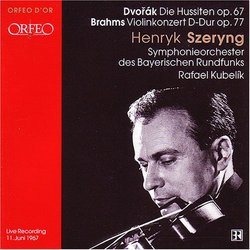An historical evening!
Hiram Gomez Pardo | Valencia, Venezuela | 09/19/2008
(5 out of 5 stars)
"The achieved rapport between this Orchestra and Rafael Kubelik is something worthy to remark along the annals of the music. One may realize this reciprocal fondness and devoted admiration of conductor and ensemble. Additionally, Kubelik was one these conductors who in live recordings seemed to enhance his own levels of distinguished expressiveness, exuberant vitality and steeled conviction around the score to perform.
That's why his Dvorak always sounded so exhilarating, vigorous, emotive, charming and radiant. Let's recall, for instance his landmark performances of Dvorak's Slavonic dances with this same Orchestra, for instance.
On the other hand, we have as guest soloist a million carats violinist, whose superb intonation, consummate technique, tuneful playing and artistic honesty was immediately perceived by the great audiences around the world.
So, when you blend these two artists, the overcome could not be more successful. That evening (June, 11, 1967) must have been for that fortunate audience, a day to remember for the rest of their lives.
I don't fear to be qualified as exaggerate at the moment to affirm we are in presence of one of the most vivid Brahms Violin Concertos ever recorded . And we should keep in mind there are vibrant and unerring versions along the history.
The first movement begins with a declamatory approach, that permits to maintain a growing cohesion along the way, supported by a superior vision that makes it so astonishingly effective.
But the basic factor which makes it so overwhelming, resides in the fact Kubelik impress the work of that Gypsy melancholic accent that never may be regarded as tear-stained, specially in the second movement so commonly performed and approached of deformed lyricism until melodramatic levels. In this case, soloist and conductor maintain an epic noblesse far from that cheap sentimentality so typical of the last Romantic period.
The finale is incandescent, a brilliant tour de force that ignites the podium and inflames the spirit.
Don't let to acquire this invaluable historical register.
"


 Track Listings (4) - Disc #1
Track Listings (4) - Disc #1